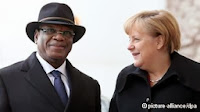Germany is Mali's 'more important partner in the world,' President Boubacar Keita told reporters at a press conference in Berlin on Wednesday afternoon. The newly elected leader gave a brief account of the current state of affairs in his country, which found itself divided less than a year ago by Islamist rebels.
'The monster hasn't been killed yet. It's still showing signs of resistance,' Keita said, referring to renewed violence in Mali's north. There, the
Tuareg-separatist National Movement for the Liberation of Azawad (MNLA) and other al Qaeda-linked Islamist groups continue to launch attacks against civilians, as well as international peacekeepers and Malian troops.
'We must heal these wounds. We must reconcile people to one another,' he said, adding that leading the government into a state of stability and integrity was his top priority toward healing his country.
Keita pledged to be a reliable recipient for German aid, describing Mali's past problems with corruption as something he and his government had left behind 'forever.'
Challenges remain for recovery
As part of EU and UN initiatives implemented following the French-led military intervention in early 2013, Germany has trained more than 100 Malian soldiers and given 100 million euros ($140,000) to the North African country.
On Wednesday, Merkel pledged continued support for the Malian government. She also praised Mali's successful September elections, which brought Keita to power, describing them as a sign of hope.
'But we know, that [the recovery process] is not over yet,' Merkel added.
Unrest began in early 2012 with a military coup, which led to the ouster of then President Amadou Toumani Toure. The weakened state allowed the Tuareg separatist MNLA to gain control of the country's north. Al Qaeda-linked groups helping the ethnic separatists gradually exercised their own influence over the region and imposed an extreme version of Islamist law.
In January, Mali's government asked France to lead a military intervention to halt a rebel-led march toward the capital, Bamako. Thousands more troops, mainly from the Economic Community of West African States joined the effort.
During the international intervention, Germany refrained from sending soldiers into the conflict, opting instead to provide logistical support and equipment.

No comments:
Post a Comment